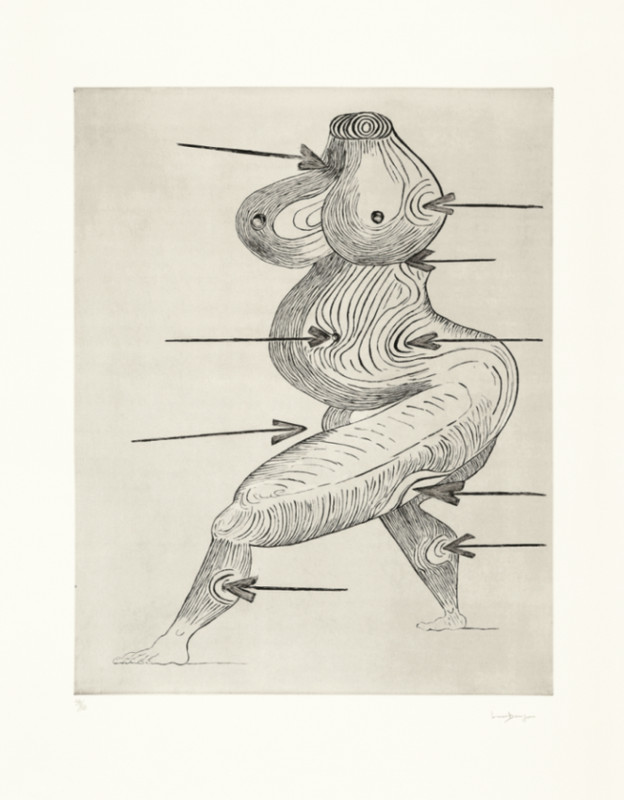Louise Bourgeois
26 Jan - 30 Mar 2013
LOUISE BOURGEOIS
Editions
26 January – 30 March 2013
“They might look different, but the subjects themselves are the same,” Louise Bourgeois once remarked about her works. Birth and death, fear and love, sexuality and the human body and its injuries were topics with which she engaged continuously, and which are linked to her own biographical background. More than almost any other artist, Bourgeois was driven by an almost obsessive need to express her thoughts and emotions. Parallel to her sculptures, instal-lations, and drawings, she created an oeuvre of prints that also takes up the main themes of her art. Galerie Karsten Greve devotes its first exhibition of 2013 to Louise Bourgeois’ print editions.
From the end of the 1930s, prints played a central role in Louise Bourgeois’ oeuvre. After she moved to the US, she created not just individual prints, but especially in the 1940s also entire series that represent an attempt to narrate and thus understand, process, and maybe also ban the fears, injuries, and disappointments she had suffered. Her earliest portfolio, entitled He disappeared into complete silence, was made in 1947 and demonstrates her loneliness and despair. After the end of the war, she was greatly distraught that many of her emigré friends left the US to return to their home countries. After this period, she only returned sporadically to printmaking, but in the 1990s she had a highly productive period in which she once again also made numerous prints. In them, Bourgeois explores the qualities of various materials and techniques, and she focuses in particular on drypoint and aquatint.
As support, she uses various kinds of paper and fabrics, including bed sheets or tablecloths, which transports memories inherent in them and thus creates links to very personal experi-ences, places, and past times. Especially interesting is that textile materials become as impor-tant for her two-dimensional works as in her sculptural oeuvre. In her works, she seeks out antithetic associations and links geometric and organic, figurative and abstract shapes. She contrasts delicate lines with rough hatchings, seemingly spontaneous lines with bold colour fields. Many of the prints are completed with hand-painted areas, coloured inks, and water-colours, giving them the air of one-of-a-kind works.
Louise Bourgeois was born in 1911 in Paris. Her works first attracted attention in the US, especially in New York, where she lived from 1938 onwards. In 1982, the Museum of Mod-ern Art showed the first retrospective of her work, which led to further exhibitions throughout the US and, starting in 1989, also in Europe. She became widely known internationally through her participation in the documenta IX in 1992 and the Venice Biennale in 1993. To-day, she is one of the most renowned artists in the world. Numerous museums have honoured her with important solo exhibitions. Louise Bourgeois died in 2010 in New York City.
Editions
26 January – 30 March 2013
“They might look different, but the subjects themselves are the same,” Louise Bourgeois once remarked about her works. Birth and death, fear and love, sexuality and the human body and its injuries were topics with which she engaged continuously, and which are linked to her own biographical background. More than almost any other artist, Bourgeois was driven by an almost obsessive need to express her thoughts and emotions. Parallel to her sculptures, instal-lations, and drawings, she created an oeuvre of prints that also takes up the main themes of her art. Galerie Karsten Greve devotes its first exhibition of 2013 to Louise Bourgeois’ print editions.
From the end of the 1930s, prints played a central role in Louise Bourgeois’ oeuvre. After she moved to the US, she created not just individual prints, but especially in the 1940s also entire series that represent an attempt to narrate and thus understand, process, and maybe also ban the fears, injuries, and disappointments she had suffered. Her earliest portfolio, entitled He disappeared into complete silence, was made in 1947 and demonstrates her loneliness and despair. After the end of the war, she was greatly distraught that many of her emigré friends left the US to return to their home countries. After this period, she only returned sporadically to printmaking, but in the 1990s she had a highly productive period in which she once again also made numerous prints. In them, Bourgeois explores the qualities of various materials and techniques, and she focuses in particular on drypoint and aquatint.
As support, she uses various kinds of paper and fabrics, including bed sheets or tablecloths, which transports memories inherent in them and thus creates links to very personal experi-ences, places, and past times. Especially interesting is that textile materials become as impor-tant for her two-dimensional works as in her sculptural oeuvre. In her works, she seeks out antithetic associations and links geometric and organic, figurative and abstract shapes. She contrasts delicate lines with rough hatchings, seemingly spontaneous lines with bold colour fields. Many of the prints are completed with hand-painted areas, coloured inks, and water-colours, giving them the air of one-of-a-kind works.
Louise Bourgeois was born in 1911 in Paris. Her works first attracted attention in the US, especially in New York, where she lived from 1938 onwards. In 1982, the Museum of Mod-ern Art showed the first retrospective of her work, which led to further exhibitions throughout the US and, starting in 1989, also in Europe. She became widely known internationally through her participation in the documenta IX in 1992 and the Venice Biennale in 1993. To-day, she is one of the most renowned artists in the world. Numerous museums have honoured her with important solo exhibitions. Louise Bourgeois died in 2010 in New York City.

